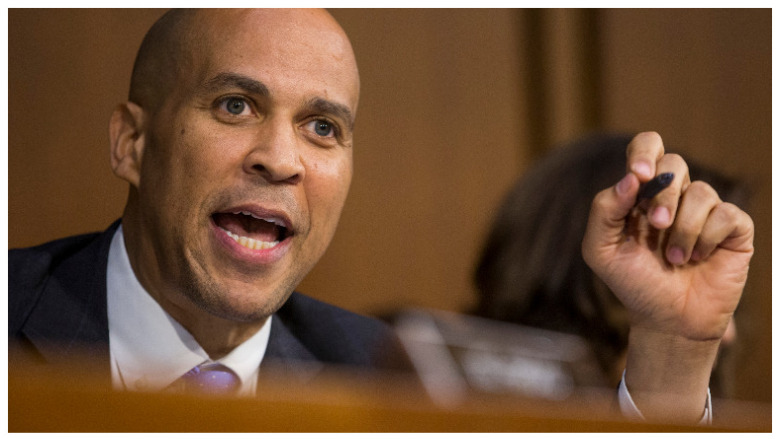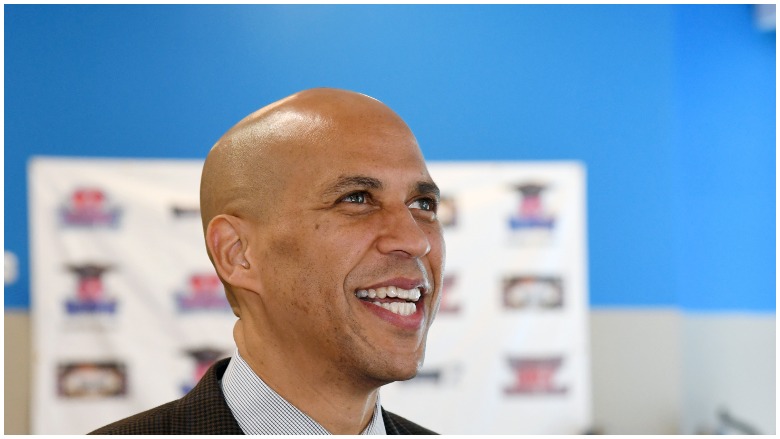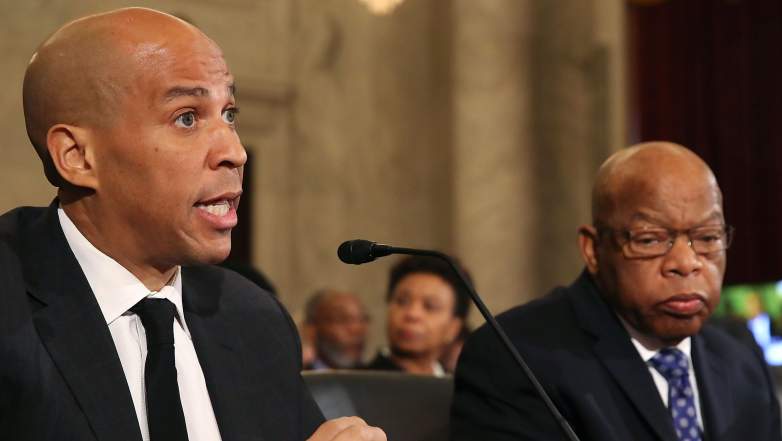
Getty Cory Booker wrote about the groping incident himself.
U.S. Senator Cory Booker once wrote a column about groping a woman when he was a teenager. The column received news attention during the Brett Kavanaugh nomination hearing. However, in contrast to Kavanaugh, Booker wrote about the incident himself, which is how people know about it in the first place.
On February 1, 2019, Booker, U.S. Senator from New Jersey and former Newark mayor, became the latest Democrat in a quickly filling up field to announce that he was running for president in 2020. The video announcement came on day one of Black History Month:
Cory Anthony Booker was born on April 27, 1969, making him age 49 at the time of the campaign announcement. He is single and has never been married. You can see a list of Booker’s reported girlfriends throughout the years here.
Here’s what you need to know about the groping incident involving Cory Booker:
Booker Described the Incident in a Column for a Stanford Newspaper

(Getty)Cory Booker
According to CNN, the incident dates to 1984 when Cory Booker was only a teenager. He wrote about it in the 1990s, the network reported, in a Stanford University column.
You can read the 1992 column in full here. It ran in the Stanford Daily. It’s called “so much for stealing second.” The column says, in part:
New Year’s Eve 1984 I will never forget. I was 15. As the ball dropped, I leaned over to hug a friend and she met me instead with an overwhelming kiss. As we fumbled upon the bed, I remember debating my next ‘move’ as if it were a chess game. With the ‘Top Gun’ slogan ringing in my head, I slowly reached for her breast. After having my hand pushed away once, I reached my ‘mark.’ Our groping ended soon and while no “relationship” ensued, a friendship did. You see, the next week in school she told me that she was drunk that night and didn’t really know what she was doing. While she liked me a lot, she said she just wanted to be friends.
However, CNN noted that the “point of Booker’s column was how that moment, and his work on the issue after, had changed him — and his views on women, consent and assault — forever.” Similarly, NJ.com reported that, in the column, Booker was “taking aim at the campus culture of men trying to get women to sleep with them.”
Booker’s spokesperson told NJ.com: “Senator Booker’s Stanford Daily column has been the focus of disingenuous right-wing attacks that have circulated online and in partisan outlets for the past five years.”

Sen. Cory Booker (D-NJ) (L), is flanked by Rep. John Lewis (D-GA), as he reads a statement speaking out against Attorney General nominee Jeff Sessions (R-AL), during a Senate Judiciary Committee hearing on Capitol Hill, January 11, 2017 in Washington, DC.
She added to the newspaper: “These attacks ring hollow to anyone who reads the entirety of the column, which is in fact a direct criticism of a culture that encourages young men to take advantage of women — written at a time when so candidly discussing these issues was rare — and speaks to the impact Senator Booker’s experience working to help rape and sexual assault survivors as a college peer counselor had on him.”
Booker also wrote in the column, “…I had begun listening to the raw truth from men and women discussing rape about two years ago as a peer counselor. The conversations were personal accounts, not rhetoric; they were real life, not dorm programing. It was a wake-up call — I will never be the same.”
Booker took an active role in the Kavanaugh questioning, at one point referring to himself as “Spartacus” when releasing confidential documents during the hearing. That led some people to accuse Booker of hypocrisy.
